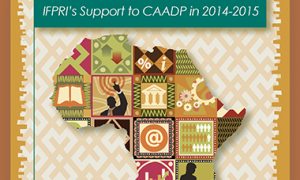L'enorme potentiel agricole de la Republique Democratiqu du Congo (RDC) est bien documente.
Search
The huge agricultural potential of the Democratic Republic of the Congo (DRC) is well Documented.
Since 2006, the International Food Policy Research Institute (IFPRI) has provided policy research and capacity strengthening support to guide the planning and implementation of the Comprehensive Africa Agriculture Development Programme (CAADP).
The main objective of this report is to identify interventions that work and recommend options for policies and programs to eliminate hunger and malnutrition in all its forms.
2016 Annual report
IFPRI continued to pursue cutting-edge research that informs pro-poor policies, programs, and interventions around the world.
In this assessment, the status and progress of Kenya on each of the metrics related to the Malabo goals and commitments is evaluated. The metrics defined here deal with goals and commitments at the continental level.
As part of IFPRI’s support to CAADP, the Regional Strategic Analysis and Knowledge Support System (ReSAKSS) was established in 2006 to provide policy-relevant analysis, data, and tools necessary to support the formulation and implementation of evi
Achieving a nutrition revolution for Africa: The road to healthier diets and optimal nutrition
Focusing the 2015 ATOR on nutrition will contribute to a broader understanding of the critical role of nutrition in achieving international, continental, and national economic growth targets
Cette étude vise à identifier les domaines en vue d’améliorer la qualité et l’utilité de l’analyse des politiques agricoles, la planification de l’investissement, le suivi-évaluation et la gestion des connaissances au niveau national.
2015 Annual report
The 2014 Annual Trends and Outlook Report examines both current and future trends that are likely to shape the trajectory of African economies.
Most decisions are taken in group contexts where one person’s behavior is affected by others. We explore drivers of coordination in Rural Producer Organizations (RPOs) of groundnut farmers in Senegal.
Highlighting achievements by IFPRI and its partners in support of the CAADP implementation agenda
This evaluation centers on how stakeholders experience ReSAKSS work at the country level. Much like looking at an open umbrella from the handle up, the perspective is of how stakeholders experience ReSAKSS work at the country, regional and continental levels from their own understanding and involvement.
Dans le cadre de la mise en place et de l’opérationnalisation du système national d’analyse stratégique et de gestion des connaissances (SAKSS national), une stratégie de renforcement des capacités est élaborée à travers notamment l’évaluation des
Le processus de mise en oeuvre du Programme détaillé de développement de l’agriculture africaine(PDDAA) s’est accéléré depuis la déclaration d’engagement des chefs d’États de l’Union africaine à Maputo en 2003 de consacrer au moins 10% de leur bud
This report includes specific findings on the number of food insecure and vulnerable people in the country, the geographic distribution of the food insecure and vulnerable groups, their characteristics, their capacity to manage shocks, and the dri






